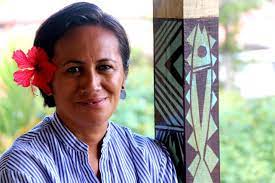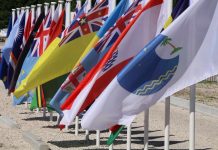An infrastructure map ‘All that Blue, That is my Dream” released by the Pacific Network on Globalisation (PANG) Thursday has provided a visual representation of the geopolitical rivalry in the region and the race to secure its resources.
Through the lens of infrastructure financing and in particular deep-water ports, the map shows their importance not only to protect sea lanes for the movement of goods and services but to maintain and provide access to raw materials and minerals.
“A picture says a thousand words and this map makes us think about external interests and the ‘development’ financing, worth billions of dollars, being poured into the Pacific and question whether it is in the interest of the Pacific Island countries or to maintain the status quo,” PANG coordinator, Maureen Penjueli says.
“While developing the map, we realised that there appears to be two approaches in the Pacific geo-politics of infrastructure- the link to the United Nations Sustainable Development Goals (SDGs) and the second is security related with the powerful global and regional players competing and vying for access to possible bases for their naval vessels and military aircrafts as well as for securing access to natural resources.”
“Bilateral and multilateral diplomacy, aid, technical assistance, and loans for major infrastructural developments feature in this competition but often missing in both these approaches is the perspective of Pacific Island Countries.”
Over recent years, China has increased its funding to the region, and this has been met with the United States of America (USA) declaring its Indo-Pacific Strategy supported by Japan, India, and France while New Zealand announced its Pacific Reset diplomacy. Australia launched its Pacific ‘Step Up’ programme and last Friday announced an increase of AUD$900million (US$580 million) of aid to the Pacific.
Released with the map is a working paper titled All That Blue: Re-sourcing, Ports, and Geopolitics in the Pacific that provides an introductory overview of geopolitics in the Pacific and the increasing competition between the hegemonic bloc of countries led by the USA which include Australia and New Zealand as a response to China’s growing influence in the region.
According to the working paper, prepared with the assistance of Professor Vijay Naidu of the University of the South Pacific, because island nations lacked funds for infrastructure development critical to their social, economic, and political development, becoming pawns in the geopolitics rivalry was a challenge.
The development of ports is integral to the Pacific as 90 percent of trade commodities are by sea, and the Pacific vision for the development of ports is provided by the Pacific Community Secretariat’s ‘Pacific Ports 2030-2050: A Vision of Resilient, Green and Clean Ports in the Pacific Islands Region’, which was presented to Pacific Islands Ministers for Energy and Transport in Apia, Samoa in September 2019.
The perspectives of the island nations are important as the Pacific Ocean is set to become the next site for the industrialisation of ocean resources under the wider Blue Economy framework.
“This ocean continent, stretching a third of the Earth’s surface, is once again being prised open into a frontier for natural resource grabs and extractive industry by powerful governments, institutions, their agents, and financiers. Not only are these powerful forces making the same old promises of economic salvation for the region, but their gospel also requires the resources of the deep as a precursor to the great green energy transition – humanity’s only escape route from a global climate catastrophe,” Penjueli said.
A website that shows natural resources, infrastructure financing, and the geo-political rivalry of the region was also launched.
For more information:
Lice Cokanasiga
Program Team Lead
Pacific Network on Globalisation
Email: researcher@pang.org.fj
Adam Wolfenden
Campaigner
Pacific Network on Globalisation
Ph: +61 401 045 536
Email: campaigner@pang.org.fj
SOURCE: PANG/PACNEWS


















